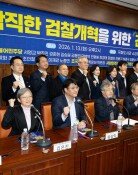[Editorial] The Tuition Race
Chung Bong-ju, an Uri Party lawmaker, proposed a deferred payment system for tuition fees after the Grand National Party (GNP) mentioned a half reduction in university tuition fees. It is necessary to verify whether the two parties suggestions are actually possible to be implemented or whether they are just baits aimed at securing votes, knowing that university students and parents will be interested.
The GNP said, Four trillion won, half the total tuition fee, can come from other sources, but apparently there is no good way to supply the money. The Uri Party said that it will issue national bonds for tuition fees, but that is ultimately the taxpayers money. It says that if a graduate doesnt earn a certain amount of income, he or she doesnt have to pay it back. However, if a graduate remains out of work, he or she has to pay another tax for unemployment benefit.
It is not desirable for politics to meddle with the tuition fee issue of private universities. University education is not compulsory and its interference with the university policy runs counter to the principle of universitys autonomy stipulated in the Constitution. In addition to the governments three "3 Nos", three policy restrictions on college admissions such as the ban on universities from administrating their own tests, weighting the competitiveness of high schools, and taking contributions for admissions, the settlement of tuition fees by the government only undermines the universities autonomy, diversity, and competitiveness. We now see the U.S. universities competitiveness coming from self-regulation. On the other hand, universities in Europe are losing their competitive advantages due to the governments excessive intervention as time goes by. Germany, which has prided itself on free education, decided to impose tuition fees beginning next year after witnessing its education quality continually declining.
Now is the time to discuss a way to improve university educations competitiveness, not to compete against each other to woo voters by using tuition fee as the issue without reckoning the complicated cause and effect. Even some analyses found that one years university tuition fees should amount to an annual national income if the quality of university education will be maintained at an optimum level. This means that the proper level of tuition fees in the era of per income capita of $15,000 should be 15 million won.
It is disgraceful for a country where more than 80 percent of high school graduates go to universities to rank 25th, one of the lowest, in terms of the public spending on universities among OECD member countries. If the political circle wants to intervene with the universities policy, it should first consolidate the underperforming universities that mushroomed in the past. It then should let universities reform themselves through competition in education quality including the tuition fee issue on their own.




![반찬통 착색 고민 끝…‘두부용기’ 버리지 말고 이렇게 쓰세요 [알쓸톡]](https://dimg.donga.com/c/138/175/90/1/wps/NEWS/IMAGE/2026/01/09/133126593.3.png)

![“배달 시키면 버렸는데”…피자 가운데 ‘그것’ 200% 활용 꿀팁 [알쓸톡]](https://dimg.donga.com/c/138/175/90/1/wps/NEWS/IMAGE/2026/01/07/133111146.3.png)
